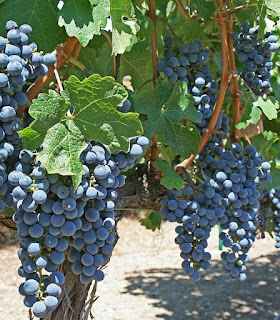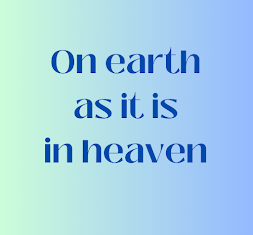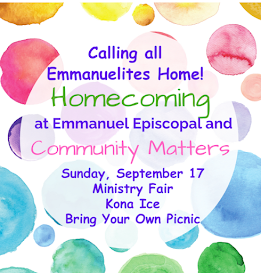Lectionary: Exodus 16:2-15; Psalm 105:1-6, 37-45 ; Philippians 1:21-30; Matthew 20:1-16
En el nombre del Dios: creador, redentor, y santificador.
I love avocadoes, and anyone else who loves them knows how important it is not to miss that tiny magic window of their ripening. One of my favorite memes on social media says it like this, in the voice of the avocado… “Not ripe… not ripe… not ripe… I’m ripe. Eat me now!... Too late…”At our Bible study this week one of our members told us about his son who has a vineyard in CA that grows grapes for wine. He says that when the grapes are ready to harvest, there is a small window to get them all picked before they go bad. It’s possible that the whole vineyard might have to be harvested in a single day, requiring lots of help. He talked about there being a sense of urgency, and that his son would welcome anyone who could come help any time during the harvest.
This urgency, and the welcoming of anyone who will help with the harvest, is reflected in our gospel story today. It’s a story that is rich in teachings about the differences between the way of heaven and the way of earth, about faith and reward, and about our sense of justice vs. God’s. Also, like last week, it comes down to our choice.
The parable of the Laborers in the Vineyard is disturbing. It pricks our sense of fairness. Why should someone who worked only an hour get paid the same as someone who worked all day?
We move easily from that question to the faith-related one: why should someone who has lived a lifetime of sin be able to have a last-minute conversion and receive the same reward as those of us who have lived a good and moral life all along?
It makes me wonder… are we jealous of them? Is living sinfully more appealing than living virtuously? Would we, if we could, choose to get away with living sinfully for as long as possible, then start living right just before we die?
And what exactly is the reward we are seeking? Is it admission into heaven after we die – or the avoidance of eternal hell and damnation?
Sadly, the Church has spent a lot of time holding up our eternal reward as a carrot on a stick, an enticement. The metaphor implies that if we don’t go where the carrot leads us, we will get whipped by the stick as punishment. Effective, but not faithful, and on behalf of the Church, I apologize to anyone who received this message.The truth is, God doesn’t hold up any enticements for us. They aren’t necessary. Neither is God waiting to punish us if we don’t go where we’re led or do what we “should” do. The choice to follow God, to live in the life of God on earth, is always ours to make. When we choose that, then cry out in distress because things went wrong, God is there, listening, loving, and sustaining us.
As we heard in our reading from Exodus, even when God’s people balked and complained, God remained with them, responding to their needs and providing all that was necessary as they journeyed to the Promised Land.
And what is the Promised Land? I’ll tell you what it isn’t: it isn’t a place in the same way the kingdom of God isn’t a place. The kingdom of God, in Greek the basileia of God, is about God’s dominion, God’s power, and God’s way.
God’s dominion is over the totality of all that is, ever was, and ever will be because God is the creator of all. God’s power is love, emanating again and again into physical form in what is created, transforming sin by forgiveness and division into unity, in other words, earth into heaven. Finally, God’s way is becoming one with the created, first in Jesus, then by our Baptism, in all of us, dwelling with us on our earthly pilgrimage, and, at the end of our lives, reconciling us back into the love that created us.
Our Promised Land, our reward is living our lives in the eternal presence of God, becoming aware of our oneness with God in our hearts, minds, spirits, and souls. How blessed are we who get to know this for most or all of our lives? How much, then should we rejoice, each time someone comes to know and live this reward - no matter how late they arrive at it?
Let’s look more deeply at these latecomers. Beginning with the story from our Scripture, the day laborers were unemployed, very poor, and had little to no protection. They were desperate, which made them vulnerable to cruel employers. They usually earned a pittance, barely enough to feed themselves, much less their families. They would never get ahead on their wages. They could only survive day to day.The day would begin for them standing outside in the town square waiting to get “picked” for work. Some might say that those who came early were motivated to work and, therefore, more deserving of being picked than those who came later. Unless… they had a sick family member or little ones at home they had to prepare to be alone all day. Unless… they themselves were sick or worn out from their labor the day before. Unless… they had arrived early and were picked by a cruel employer, so they left there and went back to the town square to try and get picked again.
Each day, these laborers would wonder if they would survive the day. They’d fret over not earning enough to feed their families and stress over whether or not they’d get picked to work or get picked by a cruel employer and what that would mean for them. Would they survive unhurt? Would they get sick from poor food, intense labor, or unsafe conditions?
These laborers weren’t getting away with anything. The grace the vineyard owner showed them was divine grace. Their suffering was known, and someone cared about them enough to provide what they needed. The amount they received was the right amount in the way of heaven, even if it seems unfair in the way of earth.
Those laborers who were picked by the vineyard owner early in the day enjoyed a full day’s labor in safe conditions. They received the payment they were promised. Their hard work was rewarded. Their expectation that they should receive more than someone else, someone who didn’t work as long or as much as they did is the perspective of the way of earth, and its focus is on the self: I worked all day. I deserve more than that person over there who only worked an hour.The way of heaven is different. Remembering the urgency of the harvest and the need for help, what if the laborers chosen in the morning celebrated each time more help arrived? What if their focus was on the harvest, and not themselves? What if the community of laborers bonded in solidarity with one another, celebrating what they had been given rather than complaining about what they didn’t have compared to someone else? That would be the way of heaven happening on earth.
Now let’s consider how this metaphor works regarding faith. Do we celebrate that one who had been lost and now has been found, that one who had been separated and is now reunited in the family of God?
The way of heaven on earth is not a zero-sum game. One doesn’t get reconciled to God by kicking another one out. The love of God is inclusive of all who are created of God - which is everyone, anywhere, in any time.
Remembering that sin is separation from God, one another, and even oneself, when someone is living a sin-full life, they aren’t getting away with anything. They are lost, alone, desperate to be truly loved and to belong to a community.
They may look like they’re OK or having fun in their debauchery, but they aren’t. That’s just their public face, which is a defense against their pain and loneliness. Behind closed doors, there are drugs or alcohol to numb their pain, licentiousness to help them feel connected to anyone in any way, and self-harm to punish themselves for their unworthiness – or just to feel alive, instead of like the walking dead.
How can we not rejoice when one of these finally recognizes that they can choose to receive the grace God is continually offering? How can we not celebrate that by this choice, their suffering and loneliness are ended, they know they are loved and cared for, and that they are part of something big and wonderful: the family of God?
Reconciliation is God’s justice. It is God’s grace, God’s gift to all of us. How can we do anything but celebrate whenever it happens?Let us pray: Generous God, thank you for setting us free to receive the abundance you always have ready to give to us. Help us to remember that you created us all, you love us all, and you choose us all. Unite us into one body by your Holy Spirit, that we may rejoice to serve you, working to make life on earth more like life in the kingdom of heaven. We pray this in Jesus’ name. Amen.








